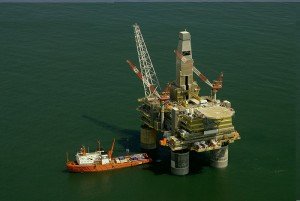Fadi Assaf.
The discovery of offshore gas in the eastern Mediterranean basin has undoubtedly become part of economic stakes in the region, stirring local, regional and international envy, and further complicating an already complex geopolitical map. Turkey, Cyprus, Israel, Syria and Lebanon each defend their gas potential in the Mediterranean, fueling an existing competition, if not a clear animosity, between riparian countries of the same hydrocarbon-rich area. For various players, including international companies that might be interested in the economic potential of Mediterranean gas, regional tension in general and territorial conflicts in some cases, pose much uncertainty on the exploitation of gas fields.
Companies are well aware that the security of offshore gas installations is problematic, where natural resources fuel national rivalries and sometimes spark armed conflicts. Terrorism and piracy add to the threats of offshore installations. In Lebanon, military protection of offshore gas facilities is already at the centre of all interests. International partners and operating companies do not ignore they are stepping in an area of tension and disputed borders, and should integrate this risk into their calculations. The lower the risk, the stronger the position of the Lebanese State to negotiate its partnership and exploitation agreements, and the more benefits Lebanon will reap from offshore gas. Lebanon is aware of the need to provide the most advantageous political, legal, security and economic environment, to obtain the most favorable conditions for the exploitation of its gas resources.
The Lebanese government is attempting to manage issues relating to the delimitation of disputed areas with Israel and Cyprus, and does not exclude resorting to international arbitration. Bogged down in its endless blockages, the government, through the Ministry of Foreign Affairs, is preparing the delimitation of the Lebanese maritime space. The Ministry of Energy continues the preparation of legal and organizational instruments to launch international tenders and administer this new activity, while its financial returns are expected to be managed by a new type of institutions for Lebanon, a sovereign wealth fund. Other ministries are also involved, especially the Ministry of Defense which remains the main actor in the delimitation of the national maritime space.
Assisted by the UNIFIL in its operations south of the Litani, the Lebanese Army benefits from a direct and valuable contribution at sea from UN vessels. This international assistance, necessary early in the exploitation of gas fields in the south, will not be sufficient, however. Throughout its mandate, the UNIFIL navy will contribute, under its supervision of the Lebanese and international maritime space as per UNSCR 1701, to ensuring a stable environment for the exploitation of offshore gas fields. But again, this supervision does not constitute an absolute guarantee or an absolute protection.
The military protection of offshore installations, necessary even in a calmer geopolitical context and despite international vigilance, remains the obligation of the Lebanese authorities. Even today, the Lebanese Army is short of the technological and operational means to fulfill such a mission. As soon as the issue of offshore gas made it into the official debate, Hezbollah stepped in, threatening to retaliate against any threat to Lebanon’s energy wealth. The approach is only logical and coherent. In the absence of a true national defense strategy, Hezbollah, a major political and sectarian component of Lebanon, set itself up as a defender of national interests against Israel. The organization, which managed to damage an Israeli warship in 2006, has the necessary means to deter the Israelis from attacking the Lebanese gas interests. The Lebanese Army does not have the ballistic and technological means of Hezbollah for this type of operations, and “deterrence” will bear no fruits without the determination of the Shi’ite organization against Israelis. The division of roles between Hezbollah and the Lebanese Army, which must be re-evaluated in the context of the “national defense strategy”, remains an internal Lebanese affair, which grants even more credibility to the deterrence strategy brandished by Lebanon, through Hezbollah, to defend its offshore gas resources.
For external partners, this strategy entails a significant share of instability, and thus risks and insecurity. Shouldn’t foreign countries interested in the exploitation of Lebanese offshore gas, and their companies, work on a package-deal that would integrate the security of gas installations and their dependencies? Deterrence may even be more successful, if advanced technologies are made available to the Lebanese Army as part of the exploitation of gas resources. In this case particularly, Hezbollah would be more discreet and stand behind the Lebanese Army, pending a possible redefinition of the national defense strategy…

